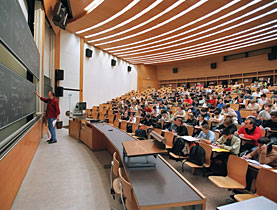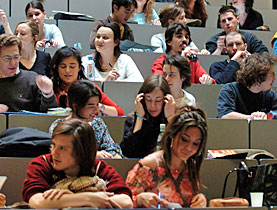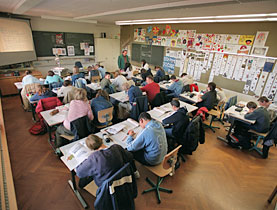School rankings list touches raw nerve

A decision by Zurich's Federal Institute of Technology to list the schools their most successful students enrolled from has touched upon a Swiss educational taboo.
The list has been perceived as a ranking system revealing which schools produced the best students for the highly rated science and technology university – and which delivered the worst.
Unlike the United States and Britain, the Swiss educational system does not compare the performance of schools. Access to universities is also open to anyone who gains an upper secondary school diploma (Matura) without having to complete an entrance exam.
The Federal Institute insisted that it was not trying to create competition amongst schools for the best pupils when it published its list last week.
The ranking list was contained in a general profile of factors common to successful students and was designed to inform future intakes about the best path to follow.
However, Christoph Niedermann, secretary to the rector’s office, told swissinfo that the ranking should also send out a message to those schools whose students did not come up to scratch.
Nerve hit
“Schools should be interested in how their pupils are doing [at the Institute], and the only way to do this is to compare with other schools,” he said. “Some schools that claimed to be elite are ranked in the middle of the list, and should perhaps work as hard as others.”
The list clearly hit a nerve with some of the schools ranked lower down the scale. One school in Zurich protested that it specialised in a diverse range of subjects suitable for other universities and should not have been compared to science specialists.
The Swiss Conference of Cantonal Ministers of Education said the list should be taken with a pinch of salt because it only compared 60 out of 160 secondary schools in Switzerland. Furthermore, it only compared the performance of students after they had left compulsory education and not the schools themselves.
“This data cannot deliver an indicator on the general quality of Matura [secondary] schools in Switzerland,” spokeswoman Gabriella Fuchs told swissinfo. “There is no culture of ranking schools in Switzerland. We do not think that this is necessary for piloting our system.”
Shake things up
But some observers think it is about time rankings are introduced to the system as universities face competition from abroad to attract the best students. Universities are also under pressure to produce better graduates as global companies look for places to relocate.
The Swiss engineering sector is currently facing a shortfall of around 3,000 skilled workers as fewer students opt for science and technology subjects in higher education.
“Competition among schools is taboo, but the world is becoming more globalised and Switzerland needs to get competitive,” Christophe Clivaz, director of the Swisslearning organisation that works to attract foreign students to Swiss universities, told swissinfo.
“If ranking systems are made on the basis of objective, reliable and scientific research then it would be good to shake things up and make people ask questions.”
swissinfo, Matthew Allen in Zurich
The Federal Institute of Technology Zurich looked at the performance record of 5,216 students between 2004 and 2007.
It looked at where they had attended secondary school, what subjects they had taken and compared their school diploma (Matura) grade compared to their performance at the Institute.
Unsurprisingly, those who had come away from school with a good Matura usually continued with good grades in further studies.
Younger students, that did not take a break from education, came up with the best exam results at the Institute.
The survey also found that those students that studied physics or mathematics at school also did better than law or economics students.
The report also ranked the 60 schools from which students had enrolled, and graded them according to the success of their former charges at the Institute.

In compliance with the JTI standards
More: SWI swissinfo.ch certified by the Journalism Trust Initiative



You can find an overview of ongoing debates with our journalists here. Please join us!
If you want to start a conversation about a topic raised in this article or want to report factual errors, email us at english@swissinfo.ch.